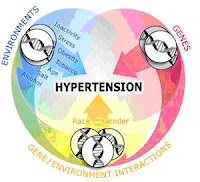Hypertension, also referred
to as high blood pressure, is a condition in which the arteries have
persistently elevated blood pressure. Every time the human heart beats, it
pumps blood to the whole body through the arteries.
 Blood pressure is the force of blood pushing up against the
blood vessel walls. The higher the pressure the harder the heart has to pump.
Blood pressure is the force of blood pushing up against the
blood vessel walls. The higher the pressure the harder the heart has to pump.
The normal level for blood pressure is below 120/80, where
120 represents the systolic measurement (peak pressure in the arteries) and 80
represents the diastolic measurement (minimum pressure in the arteries). Blood
pressure between 120/80 and 139/89 is called prehypertension (to denote
increased risk of hypertension), and a blood pressure of 140/90 or above is
considered hypertension.
What causes hypertension?
Though the exact causes of
hypertension are usually unknown, there are several factors that have been
highly associated with the condition. These include:
- ·
Smoking
- ·
Obesity or being overweight
- ·
Diabetes
- ·
Sedentary lifestyle
- ·
Lack of physical activity
- ·
High levels of salt intake (sodium sensitivity)
- ·
Insufficient calcium, potassium, and magnesium
consumption
- ·
Vitamin D deficiency
- ·
High levels of alcohol consumption
- ·
Stress
- ·
Aging
- ·
Medicines such as birth control pills
- ·
Genetics and a family history of hypertension
- ·
Chronic kidney disease
Symptoms of Hypertension
There is no guarantee that a
person with hypertension will present any symptoms of the condition. About 33%
of people actually do not know that they have high blood pressure, and this
ignorance can last for years. For this reason, it is advisable to undergo
periodic blood pressure screenings even when no symptoms are present.
Extremely high blood pressure
may lead to some symptoms, however, and these include:
- ·
Severe headaches
- ·
Fatigue or confusion
- ·
Dizziness
- ·
Nausea
- ·
Problems with vision
- ·
Chest pains
- ·
Breathing problems
- ·
Irregular heartbeat
- ·
Blood in the urine
How is hypertension diagnosed?
Hypertension may be diagnosed
by a health professional who measures blood pressure with a device called a
sphygmomanometer - the device with the arm cuff, dial, pump, and valve. The
systolic and diastolic numbers will be recorded and compared to a chart of
values. If the pressure is greater than 140/90, you will be considered to have
hypertension.
In order to perform a more thorough diagnosis, physicians
usually conduct a physical exam and ask for the medical history of you and your
family. Doctors will need to know if you have any of the risk factors for
hypertension, such as smoking, high cholesterol, or
diabetes.
How can hypertension be prevented?
Hypertension can best be
prevented by adjusting your lifestyle so that proper diet and exercise are key
components. It is important to maintain a healthy weight, reduce salt intake,
reduce alcohol intake, and reduce stress.
TREATMENT
The main goal of treatment
for hypertension is to lower blood pressure to less than 140/90 - or even lower
in some groups such as people with diabetes, and people with chronic kidney
diseases. Treating hypertension is important for reducing the risk of stroke,
heart attack, and heart failure.
High blood pressure may be
treated medically, by changing lifestyle factors, or a combination of the two.
Important lifestyle changes include losing weight, quitting smoking,
eating a healthful diet, reducing sodium intake, exercising regularly, and
limiting alcohol consumption.
Medical options to treat
hypertension include several classes of drugs. ACE inhibitors, ARB drugs, beta-blockers,
diuretics, calcium channel blockers, alpha-blockers, and peripheral
vasodilators are the primary drugs used in treatment. These medications may be
used alone or in combination, and some are only used in combination. In
addition, some of these drugs are preferred to others depending on the
characteristics of the patient (diabetic, pregnant, etc.).
R. Y. MANABAT, R.N.
 Blood pressure is the force of blood pushing up against the
blood vessel walls. The higher the pressure the harder the heart has to pump.
Blood pressure is the force of blood pushing up against the
blood vessel walls. The higher the pressure the harder the heart has to pump.